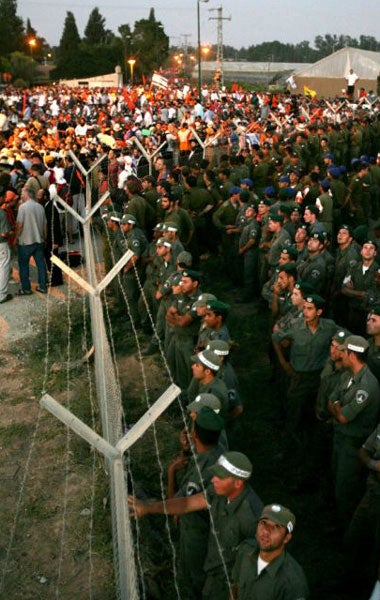Israeli MPs take the sting out of settlers' protests by rejecting delay to evacuation

While settlers continued with plans to resume their banned march towards the Gush Katif Gaza settlement block, Israel's police commissioner, Moshe Karadi, predicted an imminent end to the protest and said he hoped it would happen "with limited confrontation".
Mr Karadi told the many thousands of police and troops who have encircled the demonstrators camped in this small farming community that "both sides understand that violence is out of the boundaries".
As night fell, thousands of protesters amassed with their rucksacks packed but showed no sign of breaking through the perimeter of Kfar Maimon, heavily guarded by police backed up by troops. Settlers had earlier threatened to resume the march before sundown, and extra troops and police had been moved to the gates of Kfar Maimon to prevent any outbreak of violence.
The largely good-humoured stand-off between demonstrators and police continued into the night with upwards of 10,000 protesters likely to spend a third night in the village. Organisers had hoped they would reach Gaza by last night.
After the Knesset had rejected by decisive margins three bills to postpone the disengagement plan, Ariel Sharon, the Israeli Prime Minister, said: "I was happy with the results. In today's vote, I saw a real expression of democracy. It proved that the government, the Knesset and the public support the disengagement."
The Finance Minister, Benjamin Netanyahu, who was joined by the Education Minister, Limor Livnat, in a pointed abstention from yesterday's votes, appeared to have angered both his government colleagues by not voting against them and the settlers' leaders by not supporting them.
Although Mr Netanyahu, who is a likely challenger to Mr Sharon for the leadership of the Likud party, had indicated he would abstain, some of Mr Sharon's aides had reportedly threatened him with dismissal if he did not vote against the delay proposal.
The mood of the debate was the more heated because of the stand-off at Kfar Maimon which has increasingly been seen as a major trial of strength between the Israeli state and elected government and Jewish fundamentalists who regard every square metre of occupied territory as part of the land of Israel.
The difficulties that the government has faced in reinforcing its authority have been compounded by the security forces' determination to avoid violent confrontation with the settlers if possible.
After thanking "everyone who guards democracy and makes sure we can continue to live in a democratic state", Mr Sharon said after the Knesset vote: "I understand the pain of the settlers. It hurts me as well. I also love them. I hope we move on. We are all one nation."
An editorial in the liberal Israeli daily Haaretz called for a tougher approach to the pro-settler Israeli minority, underlining that the march had been banned. "It's better for the police and IDF [Israeli Defence Forces] to realise there is only one way to implement their decisions: with force, determination and all the means available to them. Just as the police and armies of other democratic countries do when the rabble threatens to topple them."
Although Benzi Lieberman, chairman of the Yesha Council, representing West Bank settlers, said he expected the bulk of the protesters to leave before the Sabbath starts tomorrow evening, many demonstrators signalled their determination, despite temperatures in the nineties, to march to the main Gaza settlement block of Gush Katif, now a closed military zone. This is something ministers have made clear they are determined to prevent.
One demonstrator at Kfar Maimon, Arieh Blumberg, 49, who lives in Ma'ale Admumim, the biggest West Bank settlement, said: "My first cousin lives in Gush Katif and has put some bottles of frozen water in the freezer for me. I am planning to drink one."
* Trouble between Palestinian factions flared again inside Gaza yesterday despite an agreement in the early hours designed to end several days of fighting between Hamas and Fatah-dominated Palestinian Authority forces. Hamas gunmen failed to stop at a Palestinian Authority checkpoint and later fired on a police command centre and the home of a senior Fatah official. A senior PA official, Sufian Abu Zayda, later claimed the situation was under control.
Subscribe to Independent Premium to bookmark this article
Want to bookmark your favourite articles and stories to read or reference later? Start your Independent Premium subscription today.

Join our commenting forum
Join thought-provoking conversations, follow other Independent readers and see their replies